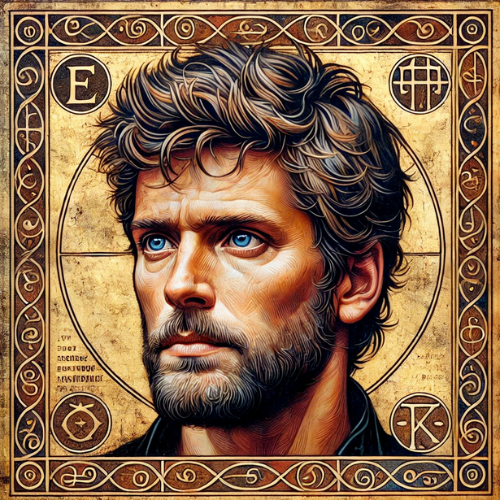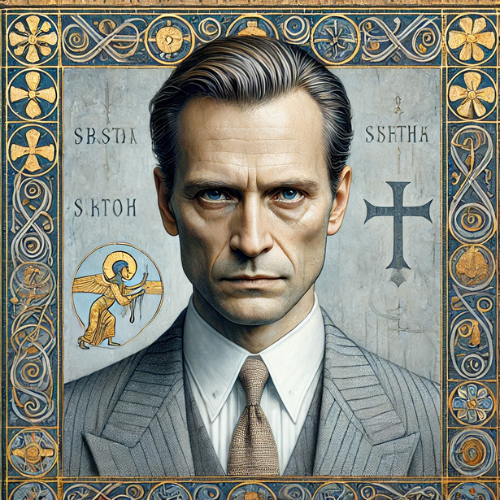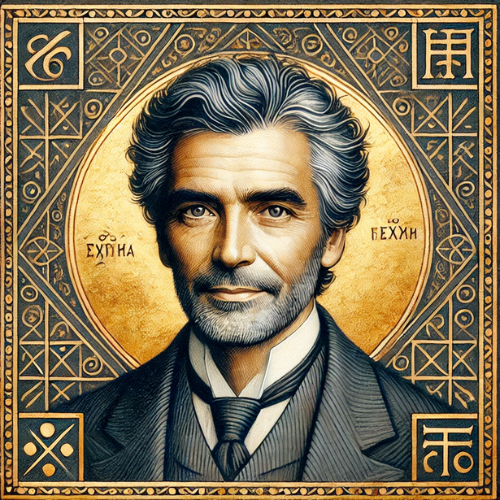CHARACTER PROFILES
Dr. Gabriel Parker

In Ascender’s Prophecy, Gabriel Parker’s journey should resonate with anyone who’s ever found themselves torn between the reality of the physical world and an inner longing for something more; something illusive, but nevertheless present. Gabriel’s character is built on an Indiana Jones archetype. He’s confident in his abilities and he’s ego driven, but he’s also got a vulnerable side that he defends with his arrogance. Gabriel begins his journey deeply rooted in the tangible. He’s a man who values what can be seen and touched, but beneath the crusty exterior his soul yearns for something more, even if he has no idea what it is.
Gabriel represents the modern seeker, someone who is driven by logic and action but slowly begins to awaken to the spiritual dimensions of life. His journey through the Labyrinth is both literal and symbolic—a quest to unite his masculine identity with the more intuitive female faculties within himself. Along the way, he confronts his doubts, fears, and the limits of his understanding, gradually transforming into someone capable of grasping the profound mysteries of the Compostela Cube.
For me, Gabriel’s story is about awakening to the idea that the answers we seek are often not found in our brains, or in the world outside, but rather within ourselves. Gabriel’s path is one of integration, blending action with intuition, and intellect with spirit. It’s a journey many of us can relate to, especially in a world where we’re taught to value the physical over the metaphysical.
Dr. Natasha Rossi

Natasha Rossi represents the divine female archetype in the novel. She’s inwardly focused, dark at times, and passive. Her work in artifact restoration is a solitary business, and she suffers from loneliness even when she’s involved in her dysfunctional relationships with men. She only lets loose when she’s dancing, but even that has been taken from her of late. As the story unfolds, her journey becomes one of profound empowerment as she breaks free from old patterns and moves out into the physical world.
In keeping with her archetype, Natasha is sensitive, intuitive, and inward-moving. But just as Gabriel has a dormant feminine side or anima, Natasha’s dormant side is the animus, her unconscious male side. As the plot unfolds, she bravely dives into the many dangers she encounters and slowly begins to draw on this masculine energy within her.
What I love most about Natasha’s character is her transformation from someone who passively allows herself be led by Gabriel and the others in the first half of the novel, to her coming into her own when she enters the Labyrinth. It is she who leads Gabriel there, calling on all her inner faculties to move through her fears and make sense of the riddles that lock each seal.
Her journey should resonate with anyone who’s sat watching life pass by, only to make a stand for something important and take action. She shows us that the path to spiritual growth isn’t always active—it’s about accepting our limitations, and the uncertain nature of life, until the time comes to act. Natasha’s story is also a reminder that the outward-moving faculties we need are already inside us, only waiting to be activated.
Christian Antov

Christian Antov’s story in Ascender’s Prophecy is a darker one, a tragic tale about how cruelty inflicted in a person’s childhood can drive them to commit acts of brutality and malice. His descent into darkness is painful to witness. Christian’s character begins as a troubled artist, deeply scarred by unspeakable abuses suffered in his formative years, but it gradually spirals into something much more sinister.
Christian is consumed by forces greater than himself, becoming a vessel for the reptilian powers that seek to destroy the will of humanity and imprison it for eternity. His fall represents the dangers of unchecked ambition and the destructive potential of refusing to confront and transform our shadow self. He’s the mirror image of his brother Isaac, but whereas Isaac grows into his spiritual role, Christian succumbs to his inner demons.
For me, Christian’s story is a reminder of the delicate balance we all walk. His downfall is a result of denying his higher-self and embracing the darkest aspects of his psyche. His journey offers a stark reflection on what can happen when we allow fear and hatred to take over—something that feels all too relevant in today’s world.
Isaac Rodchenko

Isaac Rodchenko is perhaps one of the most complex characters in Ascender’s Prophecy. He is both the Betrayer and the Consilio; he who will release a great evil upon this world, but also the potential savior spoken of in the Ascender’s Prophecy. He embodies the act of transcending the self-loathing that infects the human condition, a fundamental milestone on the path to enlightenment. By accepting his abominable actions (brought on by the dark hand of his family’s lineage) and embracing the struggle to reconcile his role in the unfolding prophecy, Isaac’s story becomes one of redemption. He learns that darkness must sometimes be embraced and traversed in order to reach the light, and throughout the novel, Isaac battles with himself, torn between his burden of guilt and the possibility of salvation to be found through his service to The Two.
What I find most compelling about Isaac is his evolution from someone in denial of his past, to someone who embraces his darkest actions to make way for transformation. His journey speaks to the power of forgiveness—not just of others, but of oneself. For anyone grappling with the complexities of their own life path, Isaac’s story is a reminder that we all have the power to change, no matter how deep our wounds may run.
